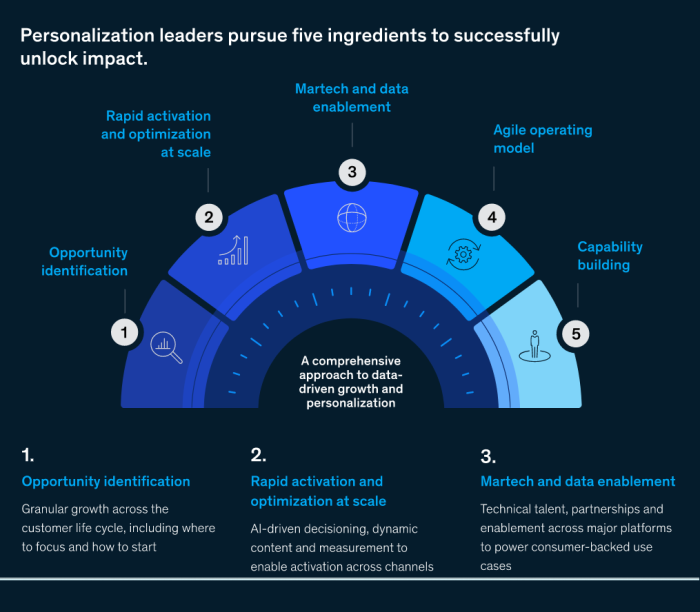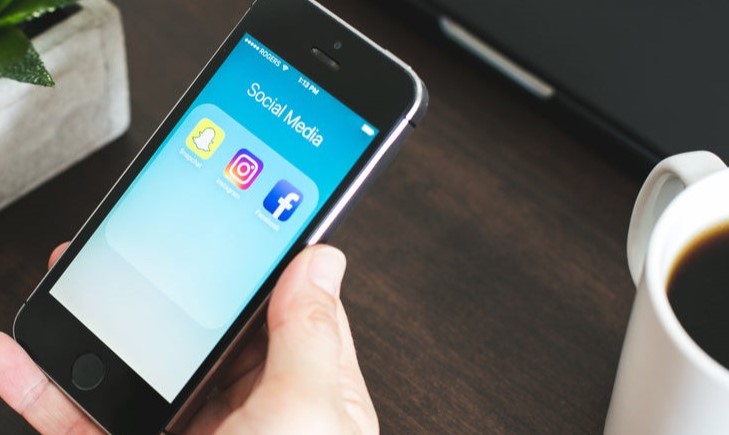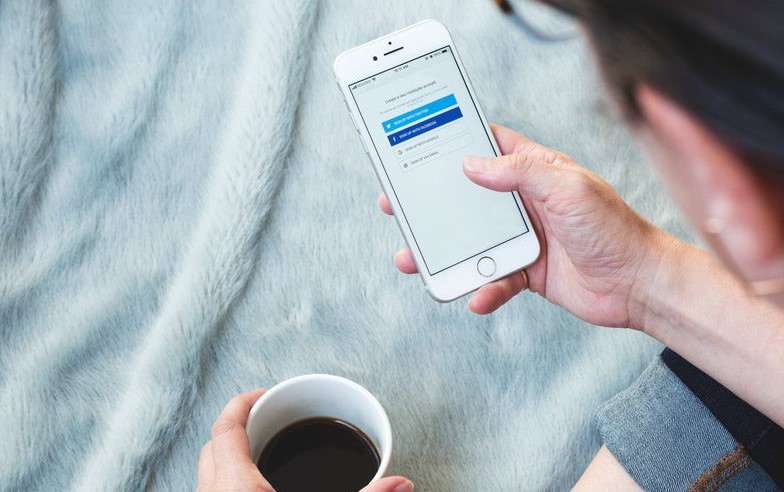
The Role of Personalization in B2B Growth Marketing
As the world of B2B marketing continues to evolve, businesses are finding it increasingly challenging to differentiate themselves from their competitors.
According to a McKinsey report, it was found that personalization can lead to a 5-15% increase in revenue, and businesses that personalize their web experiences see an average increase of 19% in sales. Furthermore, customers are more likely to do business with companies that offer personalized experiences, according to the Boston Consulting Group.
In this environment, personalization has become a critical factor in driving growth and building relationships with customers.
One of the main challenges, many companies are still reporting is among many others, the need to collect and analyze customer data to create personalized experiences. This can be a complex and time-consuming process, as businesses need to ensure they are using customer data in a responsible and ethical way. In addition, there is a risk of over-personalization, which can lead to customers feeling like their privacy is being violated.
In this article, we will explore the role of personalization in B2B growth marketing and provide actionable insights on how to use personalization to drive results, also, we will share several best practices for implementing personalization, and we will also share how some companies are doing it.
The Importance of Personalization in B2B Growth Marketing

In the world of B2B marketing, personalization in B2B growth marketing is more critical than ever. According to our experience, 80% of customers are more likely to do business with a company if it offers personalized experiences. Furthermore, 90% of marketers believe that personalization is the key to success in B2B marketing. These statistics underscore the value that personalization can bring to B2B growth marketing.
Personalization allows businesses to create more targeted and relevant content for their customers. By using customer data to understand their needs and preferences, businesses can tailor their marketing messages to resonate with their target audience. This can lead to higher engagement rates, more effective lead generation, and ultimately, increased sales.
Building Relationships with Personalization
One of the most significant benefits of personalization in B2B growth marketing is the ability to build stronger relationships with customers. When a company offers personalized experiences, customers feel that the business values their individual needs and preferences. This can help to create a sense of loyalty and trust that is difficult to achieve through generic marketing messages.
To build strong relationships with personalization, businesses need to start by collecting data about their customers. This can include information about their industry, job title, pain points, and interests. By using this data to create customer personas, businesses can develop a deeper understanding of their target audience and create personalized experiences that speak to their specific needs.
Personalization can be applied to all aspects of B2B marketing, from email campaigns to website content. By using customer data to tailor these experiences, businesses can create a more relevant and engaging experience for their customers. This can lead to higher conversion rates and more effective lead generation.
Personalization Impact On B2B Lead Generation
Statista conducted a global study back in 2021, during COVID-19, named: “Personalization Impact on Revenue Worldwide in 2021, by Industry.” This study summarizes the results of a survey conducted among businesses worldwide to determine the impact of personalization on their revenue. The survey found that personalization has a significant impact on revenue across various industries, with 60% of businesses reporting that personalization has had a positive impact on their revenue.
The survey suggests that personalization is becoming an increasingly important factor in driving revenue growth for businesses around the world.
Personalization is not just about building relationships, it is also a powerful tool for driving monetary results. According to a study by Monetate, personalized emails have an average open rate of 29.3%, compared to a 5.4% open rate for non-personalized emails. Furthermore, personalized product recommendations can lead to a 70% increase in add-to-cart rates.
Personalization Benefits For B2B Sales
Higher engagement rates: Personalized marketing messages are more likely to capture the attention of potential customers and hold their interest. This can lead to higher engagement rates and more effective lead generation.
Increased trust and credibility: When marketing messages are tailored to the specific needs and preferences of individual customers, they are more likely to be perceived as trustworthy and credible. This can help build stronger relationships with potential customers and increase the likelihood of conversion.
More effective targeting: An effective personalization impact on B2B lead generation allows businesses to target their marketing efforts more effectively, focusing on the specific needs and pain points of their target audience. This can lead to more effective lead generation and a higher likelihood of conversion.
Improved customer experience: Personalization can create a more engaging and personalized customer experience, which can improve customer satisfaction and increase the likelihood of repeat business.
Some B2B Personalization Case Studies

HubSpot: HubSpot is a popular marketing automation platform that uses personalization to improve lead generation and customer engagement. The company uses customer data to create personalized email campaigns and website content, tailoring the messaging to the specific needs and interests of each customer.
Intercom: Intercom is a customer messaging platform that uses personalization to create targeted campaigns that resonate with their customers. The company uses customer data to segment their audience and create personalized email campaigns that drive engagement and improve conversion rates.
Salesforce: Salesforce is a leading CRM platform that uses personalization to create more meaningful interactions with their customers. The company uses customer data to create targeted email campaigns, personalized landing pages, and tailored sales pitches that speak directly to the specific needs and pain points of their customers.
Drift: Drift is a conversational marketing platform that uses personalization to create more engaging conversations with their customers. The company uses customer data to create personalized chatbots that guide customers through the sales process, answering their questions and providing targeted recommendations.
Marketo: Marketo is a marketing automation platform that uses personalization to improve lead generation and customer engagement. The company uses customer data to create personalized email campaigns and website content that speak directly to the specific needs and interests of each customer.
Netflix: Netflix is a well-known media streaming company that uses personalization to improve customer engagement and retention. The company uses customer data to personalize content recommendations, offering suggestions based on a user’s viewing history and preferences.
Hopper: Hopper is a travel app that uses personalization to improve the customer experience. The app uses customer data to create personalized flight and hotel recommendations, tailored to the specific needs and interests of each user.
Spotify: Spotify is a music streaming platform that uses personalization to improve customer engagement and retention. The company uses customer data to create personalized playlists and recommendations, tailoring the music selection to the specific tastes and preferences of each user.
Stitch Fix: Stitch Fix is an online clothing retailer that uses personalization to create a more engaging and personalized shopping experience. The company uses customer data to create personalized style recommendations, tailoring the clothing selection to the specific tastes and preferences of each user.
Warby Parker: Warby Parker is an eyewear company that uses personalization to improve the customer experience. The company uses customer data to create personalized style recommendations, helping customers find the perfect pair of glasses that fit their specific needs and preferences.
Dollar Shave Club: Dollar Shave Club is a subscription-based service that delivers shaving products to its customers. The company uses personalization to tailor its product recommendations to each customer’s individual needs and preferences, increasing customer engagement and retention.
Dollar Shave Club’s success with personalization can be attributed to its ability to collect and analyze customer data. By understanding their customers’ shaving habits and preferences, the company can create personalized product recommendations that resonate with their target audience.
Bonobos: Bonobos is an online clothing retailer that uses personalization to improve the customer experience. The company offers personalized style recommendations to its customers, using customer data to create tailored outfit suggestions that fit their specific tastes and preferences.
Bonobos’ success with personalization can be attributed to its ability to create a more engaging and personalized shopping experience. By tailoring its product recommendations to each customer’s individual needs and preferences, the company can create a more meaningful connection with their target audience, leading to increased engagement and retention.
The Honest Company: The Honest Company is a wellness and lifestyle brand that uses personalization in B2B growth marketing to improve customer engagement and retention. The company offers personalized product recommendations to its customers, using customer data to create tailored product suggestions that fit their specific needs and preferences.
The Honest Company’s success with personalization in B2B growth marketing can be attributed to its ability to create a more targeted and relevant customer experience. By using customer data to create personalized product recommendations, the company can create a deeper connection with their target audience, leading to increased engagement and loyalty.
Bombas: Bombas is an online sock retailer that uses personalization in B2B growth marketing to improve the customer experience. The company offers personalized product recommendations to its customers, using customer data to create tailored product suggestions that fit their specific needs and preferences.
BarkBox: BarkBox is a subscription-based service that delivers pet products to its customers. The company uses personalization to tailor its product recommendations to each customer’s individual needs and preferences, increasing customer engagement and retention.
Thinx: Thinx is a women’s underwear retailer that uses personalization to create a more engaging and personalized shopping experience. The company offers personalized style recommendations to its customers, using customer data to create tailored product suggestions that fit their specific tastes and preferences.
Blue Apron: Blue Apron is a meal kit delivery service that uses personalization to improve the customer experience. The company offers personalized meal recommendations to its customers, using customer data to create tailored meal suggestions that fit their specific dietary preferences and restrictions.
FabFitFun: FabFitFun is a subscription-based service that delivers beauty and wellness products to its customers. The company uses personalization to tailor its product recommendations to each customer’s individual needs and preferences, increasing customer engagement and retention.
Awesomedia’s Best Practices for Effective Personalization in B2B Growth Marketing: Insights From Our Experts

To effectively use personalization in B2B growth marketing, businesses need to follow best practices that ensure they are using customer data in a responsible and effective way. We are glad to share the most important with you.
Respect customer privacy: Personalization should never come at the cost of customer privacy. Businesses need to be transparent about how they collect and use customer data and ensure they are complying with relevant data privacy regulations.
Collect relevant customer data: To effectively use personalization in B2B growth marketing, businesses need to collect relevant customer data. This can include information about their industry, job title, pain points, and interests. By using this data to create customer personas, businesses can develop a deeper understanding of their target audience and create personalized experiences that speak to their specific needs.
Use data responsibly: Personalization should never come at the cost of customer privacy. Businesses need to be transparent about how they collect and use customer data and ensure they are complying with relevant data privacy regulations. In addition, businesses need to use customer data in a responsible and ethical way, ensuring that they are not over-personalizing their marketing messages or violating customer trust.
Develop targeted marketing campaigns: Elevate social proof by using proximity campaigns to reference happy customers in the same industry to your other prospects. Personalization can be applied to all aspects of B2B marketing, from email campaigns to website content.
By using customer data to tailor these experiences, businesses can create a more relevant and engaging experience for their customers. This can lead to higher conversion rates and more effective lead generation. Implement personalized direct marketing campaigns for opt-in clients with a unique customer experience and clever content marketing.
Take social media lead generation off social media by emailing personalized messages to those who follow and engage on the social media profile. Launch postcard retargeting for high-intent website visitors personalized at the product category level with a return on ad spend of 30-to-1, for this, you can use zero-party data to identify users and send relevant ad experiences by using dynamic creative optimization tools to offer personalized messaging for consumers using consented first-party data..
Use automation to deliver personalized experiences at scale: Leverage Programmatic DOOH (Digital out-of-home) to deliver personalized messages and achieve sustainable development goals, deliver hyper-personalized digital experiences, and cultivate customer success, retention, and loyalty to grow recurring revenue substantially.
ABM Strategy is highly recommended when targeting opt-in clients, this way, personalization, an distinctive customer experience, and clever content marketing strategies develop smoothly. Reach out with engraved gifts and handwritten notes with special packaging to delight top prospects and clients.
Engage the audience’s five senses during video calls and webinars to bring virtual experiences to life. Send personalized emails directly to invitees to grab attention and create an opportunity for personalized engagement and question-answering.
Continuously measure and optimize: Personalization is only effective if it is based on accurate and relevant data. To achieve this, businesses should use marketing automation tools to deliver personalized experiences at scale.
To ensure that personalization in B2B growth marketing is driving results, businesses need to continuously measure and optimize their marketing campaigns. This can involve A/B testing different personalization strategies and analyzing the results to identify what is working and what needs improvement. By continuously refining their personalization strategies, businesses can improve their customer engagement and drive more sales over time. Transactional data to provide timely, actionable insights and reach out with the right offer at the right time, is highly recommended.
Unlock the power of personalization today and take your B2B growth marketing to the next level with Awesomedia. Let’s have a chat today and discuss how we can add value to your next B2B project!

